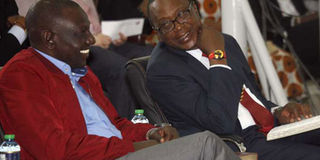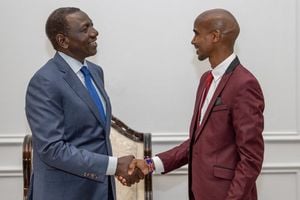What Uhuru will do if he gets another five years at the top

President Uhuru Kenyatta (right) and his Deputy William Ruto attend service at Umoja Deliverance Church in Nairobi on August 6, 2017. The President said the import culture had grown because of corruption at the port. PHOTO | EVANS HABIL | NATION MEDIA GROUP
What you need to know:
- If re-elected, he said he will spend time preparing the youth to take over the management of the affairs of the country.
When we got a call last Friday from one of our colleagues, saying State House was offering a 15-minute interview with President Uhuru Kenyatta on Saturday, we were taken aback.
Weeks earlier, he had not shown up for the national debate and the media generally is not Jubilee’s most popular demographic.
But, it is not every day that you are offered an interview with the big man himself.
EDITORS
In the Nation tradition and as a courtesy to the presidency, the President is always interviewed by the managing editor.
A panel of senior editors is preferred, but rarely accepted by interviewees.
So a chilly Friday morning found my colleagues and I — Investigations and Special Projects Managing Editor John Kamau and Sunday Nation Editor Mike Owuor — at Gate D at State House Nairobi.
EMPLOYEES
Michael was not too thrilled because he had a pile of work in the office, Saturday being the Sunday Nation’s busiest day.
The plan was for all of us to shoot the questions and for John Kamau to write.
So we waited with other folks on the way to making deliveries of cabbage and onions to the State House kitchen.
I was happy to see that most of the State House staff, especially the press, looked happy and prosperous.
INVITATION
There is good life outside the newsroom after all.
Finally, we were issued with visitor’s badges and allowed to drive in.
“Are you armed?” the guard asked. “No, I left my bazooka at home,” I cracked, but obviously State House guards are not selected for their humour.
We waited some more in the office of the Press Secretary, Mr Manoah Esipisu, who kindly allowed us to drink his government tea — it was surprisingly good tea.
SCHEDULE
John Kamau also ate his cake. So this is where my friend Isaiya Kabira spent all those years.
“There is some time pressure,” Mr Esipisu told us. He meant the President is busy, cut out the small talk and ask the most important questions.
We were taken to another waiting room. This one had a new coat of paint and some plaster work.
INTERVIEW
The Chesterfield sofas were in good leather.
The rest of State House is like the Notre Dame cathedral in Paris — restoration is urgent.
It is an old building with history in every nook. I wish I had taken a tour.
Mr Esipisu came back for me. “You are going first,” he said.
What he didn’t reveal was that there was no time for the kind of plenary interview we had planned for.
COURTYARD
I was taken to another waiting room. As we walked across the courtyard we see on TV all the time, I could see the presidential motorcade ready with the doors open and important people standing around, waiting.
So I chatted amiably with another visitor, also waiting to see the President, as were hundreds of other people in rallies across the Rift Valley.
Things happened rather quickly. The door was flung open and a tall man with a gentle stoop burst in — there is no other description for it.
He was freshly showered, looking rested in a fitting overcoat and the handshake firm; not steely, but dry, the fingers soft and long.
HISTORIC
The retainers hustled the other visitor elsewhere and closed the door.
“So what do you want from me?” he asked.
And for the first time in a career of 20 years, I was face-to-face with the President of Kenya, for an interview I had not prepared for, with time in the seconds.
I have no talent for small talk, I am not the most diplomatic man on earth and here I was with a powerful politician who would rather be out working up adoring crowds than sitting across from an ageing reporter with an attitude.
JOBS
I took a quick decision: I was going to deal with the media and how public procurement affected the ability of the economy to create jobs for young people.
But I did the “soup” first, the soapy questions, which are supposed to prepare the interviewee for the hard business: You have had hundreds of campaign meetings, what are you people on? Long silence, wistful look. “We believe in what we are doing.”
CAMPAIGNS
Do you have a last pitch? “I have made the argument almost 600 times. It’s all there for you to see.”
After all this frantic activity, what will you do tomorrow without rallies and campaigning?
There is still a lot of work to do, agents to organise and so forth, he said.
And what’s going to be your priority if re-elected? Here there was common ground, as a matter of Nation Agenda, and my own passion about youth and jobs.
YOUTH
If re-elected, he said, he will spend time preparing the youth to take over the management of the affairs of the country.
He said in his close to 600 campaign gatherings, he was surprised at the hordes of young faces readying to take leadership in Tuesday’s election.
“They are telling even those of us in our generation to get the job done and make way,” the President, who turns 56 in October, said.
Mr Kenyatta is an impressive guy.
ASSERTIVE
He does not have retired President Moi’s imperious presence, but he has his father’s big face and distinctive eyes.
He thinks well and though guarded, he is engaging, forthright and eager to get in your face, which I liked.
When I saw Philip Murgor and Ekuru Aukot on TV, I regretted not having taken a keener interest in them.
Their thinking may not have been profound, but it was fresh and bold.
Similarly, I thought I should have tried harder to get interviews with all the candidates; I wish I had interviewed the President and his rival, Mr Raila Odinga a month ago.
IMPORTS
I blew the interview at the next, and second most important, question.
Public procurement is a furnace, burning our taxes and even more insidiously, exporting the jobs that should be going to our children to China.
Are we going to institute measures to use taxes to import only what we can’t produce?
He said the import culture had grown because of corruption at the port.
UNEMPLOYMENT
This, he said, has already been tightened up and the procurement system will be made more transparent.
Also, a tight anti-money laundering regime was working and was part of the reason some businesses, which were operated illegally, were not doing so well.
I knew I had blown the chance to get him to reflect on the broader connection between our procurement culture and unemployment.
MEDIA
So we waded into the media question, the elephant in the room.
The President has strong views about the Press, not all of them flattering.
“We are sometimes condemned unheard,” I ventured, reflecting my conviction that leaders must interact more with the kind of journalists who don’t walk into their offices with an outstretched hand and a promise to run back and cook stories.
“No,” he said. “You convict those who are heard,” he answered.
FEEDBACK
And he launched into what in a communiqué might be described as a fluent, free and frank expression of his views.
It was probably not Alex Ferguson’s blow drier treatment, but it was close.
In summary: the media are trapped in the amber of prior glories, they must change with the times.
“You have a mentality problem,” he said.
I was happy to receive the President’s feedback and we parted on a cordial note, but it occurred to me that editors need to try harder to have structured dialogue with the country’s political leadership.
TENDER
As I was led through the deserted corridors of State House — half wondering in which of the many waiting rooms Martin Shikuku had eaten Ugali in 1992 — and in the car listening to the fury of an editor whose time we had wasted, I felt I had taken one for the team.
I couldn’t shrug off the feeling, though, that I was an old fool.
Which Kenyan finds himself alone in a room with the President and does not ask for a tender?





